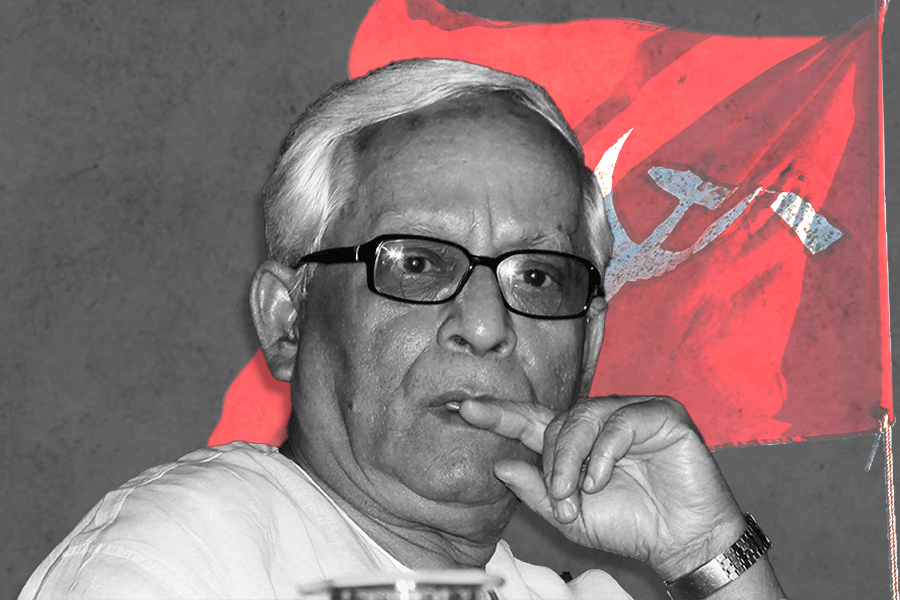The celebrations for the 30th anniversary of Left Front rule in Bengal had just got over at the Netaji Indoor Stadium in Calcutta. It was sometime in June 2007.
CPI(M) patriarch Jyoti Basu, well into his 90s, had long delivered his speech but showed no signs of departing the dais although supporters had already started leaving the tightly packed venue. That wasn’t usual, given the grand old man’s failing health and his limited public appearances.
Shortly afterwards, the stalwart was seen engrossed in an animated discussion with then chief minister Buddhadeb Bhattacharjee, his frown apparent even from a distance. Biman Bose, then Left Front chairman and secretary of the party’s state unit, soon joined what looked more like a debate than a conversation.
Again extremely unusual, given a deadpan Basu’s demeanour in public rarely bordered on the jittery and the party hardly ever exhibited its differences outside the closed doors of its Alimuddin Street headquarters.
The division on two sides of the battle line was, by then, clear. It was Basu versus Bhattacharjee-Bose and they, clearly, agreed to disagree.
Soon enough Roopchand Pal, the now-deceased Hooghly district leader and former MP, was summoned on stage.
Minutes later, when Basu left the stage, looking more unconvinced and distraught than before, a motley band of journalists and lower-ranked Left comrades surrounded Pal backstage for inputs.
“The old man isn’t thinking straight. This is about those villagers in Singur’s Bajemelia who resisted the entry of the Tata officials during their site visit in Singur and showed them brooms and chappals. He watched that on TV sitting at home and is worried stiff. He thinks things are spiralling out of control.
“Buddha-da called me to convince him (Basu) otherwise and I told him that our panchayat and peasant fronts are so strong in that region that this tiny spark would be doused even before it properly begins. There is no danger to the small car factory in Singur,” Pal bragged to this correspondent then.
A year and a quarter later, when Ratan Tata announced his decision to move the Nano project out of Bengal, the Netaji Indoor Stadium memory of a handful of journalists surely shadowed the angst that was triggered by the defeated look on Bhattacharjee’s face on that day.
What many failed to reconcile then was how a leader of a time-tested alliance of Left forces, who was voted to power with an overwhelming majority of 235 seats in a 294-member Assembly only two years back, could so quickly lose touch with his grassroots so as to not acknowledge the raging undercurrent of disillusionment with the ruling political establishment of over three decades.
That, despite an indisposed nonagenarian leader, confined to his residence, ringing the warning bell long in advance.
While the rest of it, as they say, is history, Bhattacharjee certainly sealed his place in Bengal’s political landscape as a leader whose visions for industrializing the state were thwarted by the severely problematic dynamics of land acquisition.
Bhattacharjee called the political and bloody resistance to land acquisition at both Nandigram and Singur “blips” to the inevitable roadmap to industrializing the state, a conviction he is believed to have pursued with doggedness both within his party and outside.
What most would remember, though, is the cruel irony of that conviction ultimately turning out to be the nemesis of him and the party he led at the time.
Perhaps the last of the quintessential 'Bhadralok' politician of the state whose trademark crisp white dhoti-kurta and Kohlapuri chappal matched perfectly with his grey hair and unblemished political career, Bhattacharjee’s penchant for literature, films, cricket, afternoon siesta, black coffee and cigarette embodied the decadent Bengali intelligentsia’s varied interests millennials may relate to upfront.
Sadly, the inability to build the bridge between the plans of his government to secure the state’s future and the ground reality of people’s aspirations stoked by the opposing political forces at work is a regret that Bhattacharjee is likely to have harboured till his last breath.
PTI
Except for the headline, this story has not been edited by The Telegraph Online staff and has been published from a syndicated feed.











